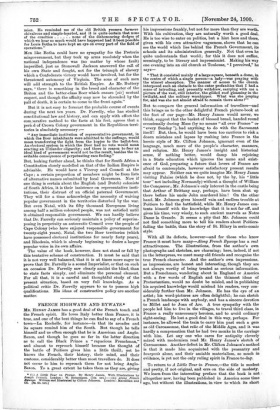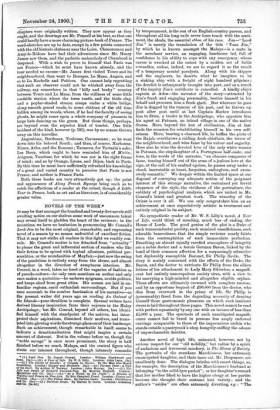FRENCH HIGHWAYS AND BYWAYS.* MR. HENRY JAMES has a good
deal of the French touch and the French spirit. He loves Italy better than France, it is true, and one of the best things he can find to say of a French ' town—La Rochelle, for instance—is that its arcades and its square remind him of the South. But though he tells himself and us often enough that he is American and Anglo- Saxon, and though he goes so far in the latter direction as to call the Black Prince a "rapacious Frenchman," and almost to reproach himself because the thought of the battle of Poitiers gives him a little thrill; yet he knows the French, their history, their mind, and their customs, considerably better than most travellers do. It does not occur to him to reproach them for not being Anglo- Saxon. To a great extent he takes them as they are, giving
• (1.) A lAttie Tour in France. By Henry James. With Illustrations by Joseph Pennell. London : W. Heinemann. [10a. net.)—(2.) Along French aSsaYs. Written and Illustrated by Clifton Johnson. London : Macmillan and Co Lea 6d• net.)
his impressions frankly, but not for more than they are worth. With his cultivation, they are naturally worth a good deal.
He is too wise to enter on politics, but a hint here and there,. given with his own attractive vagueness, shows that he can see the world which lies behind the French Government, its schools and its administration generally. Not that even he quite understands that world; for this it does not suffice,
seemingly, to be literary and impressionist. Making his way one evening into an old church at Toulouse, "I perceived," he says- " That it consisted mainly of a large square, beneath a dome, in the centre of which a single person—a lady—was praying with the utmost absorption. The manner of access to the church interposed such an obstacle to the outer profanities that I had a. sense of intruding, and presently withdrew, carrying with me a picture of the vast, still interior, the gilded roof gleaming in the twilight, and the solitary worshipper. What was she praying for, and was she not almost afraid to remain there alone P"
But to compare the general information of travellers—and this brings us to the other delightful French picture-book at the foot of our page—Mr. Henry James would never, we think, suggest that the basket of blessed bread, handed round occasionally during Mass (by no means "all over France" or "every Sunday "), had anything to do with the Sacrament itself! But, then, he would have been too cautions to risk a dozen mistakes and lapses by rushing into France in the heroic style of Mr. Clifton Johnson, ignorant even of the language, much more of the people's character, manners, and religion. Mr. Henry James's insight and historical sense, if nothing better, would damp his rejoicing in a State education which ignores the name and exist- ence of God, preparing a future that lovers of France are afraid to contemplate, however satisfactory present results may appear. Neither can we quite imagine Mr. Henry James visiting Falaise (which he does not, by the by, his "little tour" not including Normandy) without a thought of William the Conqueror; Mr. Johnson's only interest in the castle being that Arthur of Brittany may, perhaps, have been shut up there before his uncle John murdered him ! On the other hand, Mr. Johnson gives himself vain and endless trouble at Poitiers to find the battlefield, while Mr. Henry James con- tents himself with the knowledge that it is not far off, and gives his time, very wisely, to such ancient marvels as Notre Dame In Grande. It seems a pity that Mr. Johnson could not find something more to tell his readers about Poitiers, failing the battle, than the story of St. Hilary in serio-comic style.
With all its defects, however—and for those who know France it must have many—Along French Byways has a real attractiveness. The illustrations, from the author's own photographs and sketches, are charming ; here, indeed, if not in the letterpress, we meet many old friends and recognise the true French character. And the author's own impressions, as impressions, are honest and interesting, though they are not always worthy of being treated as serious information. But a Frenchman, wandering about in England or America with a few words of English and the thinnest ideas of Protestantism, would no doubt be misled, and in publishing his acquired knowledge would mislead his readers, very con- siderably further than Mr. Johnson. He has the eye of an
artist; his word-pictures are often delightful; he can sketch a French landscape with anybody, and has a sincere devotion to Millet and to Joan of Arc. A true sympathy with the people led him to live in the villages, to travel third class, in France a really unnecessary heroism, and to avoid ordinary sight-seeing. He lost a good deal in this way, perhaps. For
instance, he allowed the train to carry him past such a gem as old Carcassonne, that relic of the Middle Ages, and it was hardly a compensation that he had two monks in the carriage with him. Let any one who cares for antiquity cleverly mixed with modernism read Mr. Henry James's sketch of Carcassonne. Another defect in Mr. Clifton Johnson's method is that it made him acquainted with the peasantry and bourgeois alone, and their amiable materialism, so much in evidence, is yet not the only ruling spirit in France to-day.
To return to A Little Tour in. France,—the title is modest and pretty, if not original, and errs on the side of modesty. We learn from the interesting preface that the book is not . altogether new, having been published in America some time ago, but without the illustrations, in view to which its short
chapters were originally written. They now appear as they ought, and the drawings are Mr. Pennell at his best, so that one could hardly have a more charming picture-book of France. The word-sketches are up to date, except in a few points connected with the old historic chateaux near the Loire. Chenonceaux and Azay-le-Rideau have had their adventures since Mr. Henry James saw them, and the pathetic melancholy of Chambord is deepened. With a wish to prove to himself that Paris was not France—which he must have known already, and the tour needed no excuse—Mr. James first visited Tours and its neighbourhood, then went to Bourges, Le Mans, Angers, and so to la Rochelle and Poitiers. One cannot help regretting that smch an observer could not be whisked away from the railway, say somewhere in that "hilly and bosky" country between Tours and Le Mans, from the stillness of some little roadside station where the trees rustle, and the birds sing, and a poplar-shaded stream creeps under a white bridge, along smooth gravel roads, to some chateau of the old time hidden among its woods, where, if he had the faculty of seeing ghosts, he might come upon a whole company of peasants in large hats dancing on the green. But these things, perhaps, are beyond even the superior kind of tourist. One little incident of the kind, however (p. 181), was by no means thrown away on this traveller.
Angouleme,, Bordeaux, Toulouse, Carcassonne; so he went down into his beloved South ; and then, of course, Narbonne, Nimes, Arles, and the Romans ; Tarascon, for Tartarin's sake; Les Baux, which ought to have reminded him of 3fireio ; Avignon, Vaucluse, for which he was not in the right frame of mind; and so by Orange, Lyons, and Dijon, back to Paris. By this time he must have sufficiently refreshed his knowledge of a great and varied country to perceive that Paris is not France, and neither is France Paris.
Both these books are very attractively got up ; the print and appearance of Along French Byways being such as to catch the affections of a reader at the outset, though A Little Tour in France, both as art and as literature, is of considerably greater value.











































 Previous page
Previous page